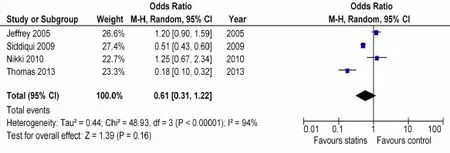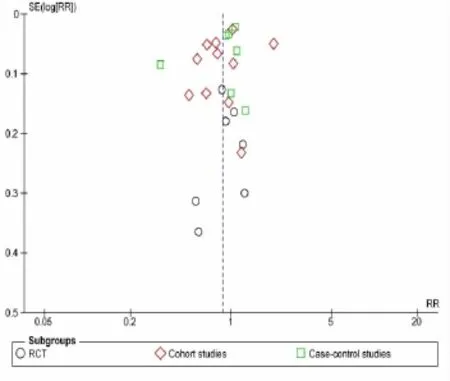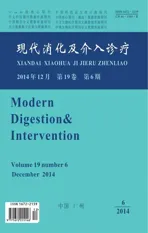他汀类药物预防结直肠肿瘤的Meta分析
2014-03-04陈羽吴礼浩马伟钦何兴祥
陈羽 吴礼浩 马伟钦 何兴祥
他汀类药物预防结直肠肿瘤的Meta分析
陈羽 吴礼浩 马伟钦 何兴祥
目的系统评价他汀类药物对结直肠癌的发病率及病死率的影响。方法使用Medline等数据库收集他汀类药物与结直肠肿瘤相关的文献,筛选高质量文献,分别计算RR或OR值以及95%CI等,分析他汀类药物预防结直肠癌及结直肠腺瘤的作用,运用漏斗图评价发表偏倚。结果共纳入30项研究,研究对象2 417 713例。他汀类药物预防结直肠癌的森林图提示存在统计学差异(RR=0.87,95%CI:0.77-0.99,P=0.03),他汀类药物预防结直肠腺瘤的森林图不存在统计学差异(OR=0.61,95%CI:0.31-1.22,P =0.16),漏斗图分析各项研究未发现发表偏倚。结论他汀类药物对结直肠癌可能起到一定的化学预防作用,而对结直肠腺瘤的作用有待进一步研究。
他汀类药物;结直肠肿瘤;Meta分析;发病率
结直肠癌(Colorectal Cancer,CRC)列美国、英国等西方国家癌症死亡谱的第二位。在我国,结直肠癌发病率已上升至恶性肿瘤的第三位,每年新发病例超17万,且近年发病率呈明显上升趋势,新发病例数以每年4%的速度增长[1]。尽管治疗措施不断改进,其整体疗效依然不尽人意。CRC多由结直肠腺瘤(Colorectal Adenoma,CRA)发展而来。然而,目前尚无一种确切而安全预防CRC的化学药物[2]。近期研究发现他汀类降脂药物具有一定的化学预防作用[3-4],然而也有不同的报道[5-6]。因此,本研究对相关的临床研究数据进行荟萃分析,旨在提供他汀类药物预防结直肠肿瘤更准确可信的循证医学证据。
材料与方法
一、检索策略
使用MEDLINE电子数据库检索,检索关键词是“Colorectal”、“Cancer(s)”、“neoplasm(s)”、“adenoma(s)”、“malignancy(ies)”和“HMG-CoA reductase inhibitor(s)”、“statin(s)”、“atorvastatin”、“cerivastatin”、“fluvastatin”、“lovastatin”、“mevastatin”、“pravastatin”、“rivastatin”、“rosuvastatin”、“simvastatin”,部分按照参考文献溯源手工查找。时间限定范围是1865年到2014年8月。检索结果由两名评价者独立评阅,意见不一致时咨询第三方。
二、纳入标准
选取发表的优质文献,纳入标准:①研究资料完整,排除缺乏完整的四格表资料的研究,均提供效应指标优势比(odds ratio)或危险比率(risk ratio)或比值比(rate ratio)或危害比(hazard ratio)以及95%置信区间(CI);②研究均设对照组,对照组为使用安慰剂及未使用他汀类药物患者,对照组与病例组年龄、性别差异无显著性;③为提高纳入文献质量及减少误差,评价结直肠癌仅纳入研究对象超过5 000例及随访2年以上的研究,由于结直肠腺瘤相关研究少,纳入随访2年以上的研究,无研究对象数量的要求,剔除重复报告、质量差、报道信息少及无法利用的文献。
三、资料提取
按照预制的标准表格提取纳入文献的相关数据。提取信息包括:①研究者,出版年限,受试者例数,平均年龄,性别比,研究地点;②实验设计细节,是否随机,随机方法,失访者例数,随访时间;③治疗方案,结直肠癌诊断方法,用Jadad评分系统评价各研究的质量:随机化、双盲、随访。根据上述设计的资料提取表格,分别由2个或2个以上评价者独立参与资料的提取,意见不一致时由第三方仲裁或通过讨论解决。
四、统计学分析
分别应用固定效应模型和随机效应模型进行Meta分析。两种模型结果的一致程度可在一定程度上反映合并结果的可靠性。运用固定效应模型计算危险度;当存在异质性时,运用随机效应模型计算危险度。回顾性研究选择OR,前瞻性研究选择RR,计算OR和(或)RR值及95%CI,并对OR和(或)RR值进行χ2检验,P<0.05为有统计学意义。使用漏斗图评价发表偏倚。Breslow-Day检验评价各研究之间的异质性。系统分析软件为Cochrane协作网提供的Revman(版本5.1.6)。
结果
一、文献概况
经认真筛选共纳入研究30项,其中随机对照研究7项[7-13]、队列研究15项[3-5,14-25]、病例对照研究8项[6,26-32]。共有研究对象2 417 713例,随机对照研究均为意愿性(intention-to-treat,ITT)分析数据;所有数据均经过各类潜在危险因素校正。研究报告发表时间的范围是1998年至2013年。
二、他汀类药物预防CRC的Meta分析
共纳入研究26项,其中随机对照研究7项[7-13]、队列研究12项[3-5,14-22]、病例对照研究7项[6,26-30,32]。共有研究对象2 409 759例,其中他汀药物组558 738例,对照组1 851 021例,结直肠癌病例范围在随机对照研究中是12~131例,队列研究32~2 566例,病例对照研究48~5 258例。
根据研究分类进行亚组分析,其中随机对照研究齐性检验(P=0.30),研究间异质性不显著,选用固定效应模型(RR=0.93,95%CI:0.81-1.08,P= 0.34);队列研究齐性检验(P<0.01),研究间异质性显著,选用随机效应模型(RR=0.85,95%CI:0.68-1.05,P=0.14);病例对照研究齐性检验(P<0.01),研究间异质性显著,选用随机效应模型(OR=0.88,95%CI:0.68-1.13,P=0.31)。
合并数据分析,各亚组间齐性检验(P<0.01),存在异质性选用随机效应模型(RR=0.87,95%CI:0.77-0.99,P=0.03),各亚组间无明显差异性(P= 0.77);Meta分析森林图(图1)中可见菱形完全位于垂直线的他汀类药物侧,存在统计学差异(Z=2.19,P=0.03),可以考虑他汀类药物对预防结直肠癌的发生起一定的保护作用。
三、他汀类药物预防CRA的Meta分析
纳入研究4项,其中队列研究3项[23-25],病例对照研究1项[31],共有研究对象7 954例,其中他汀药物组2 846例,对照组5 108例,共有结直肠腺瘤2 263例。
由于多为回顾性研究,选择OR值进行评价,各研究齐性检验(P<0.01),各研究间异质性显著,选用随机效应模型(OR=0.61,95%CI:0.31-1.22,P= 0.16),Meta分析森林图(图2)中可见菱形跨过垂直线,不存在统计学差异(Z=1.39,P=0.16),可以考虑他汀类药物对预防结直肠腺瘤的发生可能不存在保护作用。
四、敏感性分析和发表偏倚
他汀类药物预防CRC的Meta分析采用固定效应模型进行,得到结果(Z=7.29,P<0.01)与随机效应模型的结果一致,反映出合并结果基本可靠;但是他汀类药物预防CRA采用固定效应模型进行(Z =7.42,P<0.01)与随机效应模式结果不一致,反映出结果可能存在一定误差。他汀类药物预防CRC(图3)和CRA发表偏倚使用漏斗图分析,未见明显不对称,说明可能无发表偏倚。

图1 他汀类药物预防结直肠癌的Meta分析森林图
讨论
近年来大量统计资料表明,CRC作为临床最常见的恶性肿瘤之一,其发病率和死亡率均逐年升高。CRC患者中,80%以上是由CRA演变而来。内镜下CRA摘除术是目前公认的预防CRC最好的干预方式,但结直肠间期癌的发病密度每年每1 000人中仍有2.9例[33]。因此,引入化学预防的方法,旨在进一步降低CRC的发病率。肿瘤的化学预防是指利用天然或合成的化学物质预防肿瘤发生或使肿瘤分化逆转从而达到预防恶性肿瘤发生的目的。目前对结直肠肿瘤具有明确化学预防作用的药物只有非甾体抗炎药,但由于其较高的副作用而限制了其使用。近年有较多国外文献报道了关于他汀类药物与结直肠肿瘤间的关系,但是并无统一观点[17,34]。已有国外的他汀药物预防CRC的Meta分析,但是亦无统一观点[35-36]。国外的经验对于我国具有借鉴作用,然而国内无相关研究的报道。

图2 他汀类药物预防结直肠腺瘤的Meta分析森林图

图3 他汀类药物预防结直肠癌的倒漏斗图
本研究特点:①提高纳入研究的质量,剔除低质量、随访时间短和样本量少的研究,以慎重考虑他汀类药物对CRC的化学预防作用;②对他汀类药物对CRA的化学预防作用进行Meta分析,为国内外首次报道。本研究发现,他汀类药物对CRC可能具有一定的化学预防作用(Z=2.19,P=0.03),而对CRA的化学预防作用不显著(Z=1.39,P=0.16);若CRA的Meta分析使用固定效应提示他汀类药物是具有保护作用的,但可能存在研究数量少、样品量不足等原因导致异质性而使用了随机效应模型。因此,目前尚无明确证据证实他汀类药物具有阻止CRA发展为CRC的作用。
本研究提示他汀类药物可能对CRC具有一定化学预防作用与其他循证研究类似[37-38]。并有研究进一步发现他汀类药物预防CRC的作用机制[39-40],可能通过下调血管生成素2、BiP和Hsp90α等细胞因子以及DNA的自我修复起作用。本研究初步证实了他汀类药物临床应用对结直肠癌化学预防的可能作用,但具体的机制仍有待进一步研究。
本研究考虑对CRA研究数量较少而降低了纳入标准,导致了可能存在一定误差,仍有待进一步深入研究;使用Revman软件生产漏斗图判断发表偏倚过于主观;另外,本Meta分析均为国外研究,国内尚无相关研究发表,期待我国的研究数据提供更可靠的依据。
1卫生部医政司.结直肠癌诊疗规范(2010年版).中国继续医学教育,2011,3(9):1-14.
2Sostres C,Gargallo C J,Lanas A.Aspirin,cyclooxygenase inhibition and colorectal cancer.World J Gastrointest Pharmacol Ther,2014,5 (1):40-49.
3Clancy Z,Keith SW,Rabinowitz C,et al.Statins and colorectal cancer risk:a longitudinal study.Cancer Causes Control,2013,24(4): 777-782.
4Leung HW,Chan AL,Lo D,et al.Common cancer risk and statins:a population-based case-control study in a Chinese population.Expert Opin Drug Saf,2013,12(1):19-27.
5Jacobs EJ,Newton CC,Thun MJ,et al.Long-term Use of Cholesterol-Lowering Drugs and Cancer Incidence in a Large United States Cohort.Cancer Res,2011,71(5):1763-1771.
6Vinogradova Y,Coupland C,Hippisley-Cox J.Exposure to statins and risk of common cancers:a series of nested case-control studies. BMC Cancer,2011,11:409.
7Nakamura H,Yamamoto A,Mizuno K,et al.Primary prevention of cardiovascular disease with pravastatin in Japan(MEGA Study):a prospective randomised controlled trial.Lancet,2006,368(9542): 1155-1163.
8Downs JR,Clearfield M,Weis S,et al.Primary prevention of acute coronary events with lovastatin in men and women with average cholesterol levels:results of AFCAPS/TexCAPS.Air Force/Texas Coronary Atherosclerosis Prevention Study.JAMA,1998,279(20): 1615-1622.
9ALLHAT Officers and Coordinators for the ALLHAT Collaborative Research Group.The Antihypertensive and Lipid-Lowering Treatment to Prevent Heart Attack Trial.Major outcomes in moderately hypercholesterolemic,hypertensive patients randomized to pravastatin vs usual care:The Antihypertensive and Lipid-Lowering Treatment to Prevent Heart Attack Trial(ALLHAT-LLT).JAMA,2002,288(23):2998-3007.
10 Heart Protection Study Collaborative Group.MRC/BHF Heart Protection Study of cholesterol lowering with simvastatin in 20,536 high-risk individuals:a randomised placebo-controlled trial. Lancet,2002,360(9326):7-22.
11 LIPID Study Group(Long-term Intervention with Pravastatin in Ischaemic Disease).Long-term effectiveness and safety of pravastatin in 9014 patients with coronary heart disease and average cholesterol concentrations:the LIPID trial follow-up.Lancet,2002,359(9315): 1379-1387.
12 Ford I,Murray H,Packard CJ,et al.Long-term follow-up of the West of Scotland Coronary Prevention Study.N Engl J Med,2007, 357(15):1477-1486.
13 Hsia J,Macfadyen JG,Monyak J,et al.Cardiovascular event reduction and adverse events among subjects attaining low-density lipoprotein cholesterol<50 mg/dl with rosuvastatin.The JUPITER trial(Justification for the Use of Statins in Prevention:an Intervention Trial Evaluating Rosuvastatin).J Am Coll Cardiol,2011,57 (16):1666-1675.
14 Friis S,Poulsen AH,Johnsen SP,et al.Cancer risk among statin users:a population-based cohort study.Int J Cancer,2005,114(4): 643-647.
15 Setoguchi S,Glynn RJ,Avorn J,et al.Statins and the risk of lung, breast,and colorectal cancer in the elderly.Circulation,2007,115(1): 27-33.
16 Farwell WR,Scranton RE,Lawler EV,et al.The association between statins and cancer incidence in a veterans population.J Natl Cancer Inst,2008,100(2):134-139.
17 Singh H,Mahmud SM,Turner D,et al.Long-term use of statins and risk of colorectal cancer:a population-based study.Am J Gastroenterol,2009,104(12):3015-3023.
18 Flick ED,Habel LA,Chan KA,et al.Statin use and risk of colorectal cancer in a cohort of middle-aged men in the US:a prospective cohort study.Drugs,2009,69(11):1445-1457.
19 Matsushita Y,Sugihara M,Kaburagi J,et al.Pravastatin use and cancer risk:a meta-analysis of individual patient data from longterm prospective controlled trials in Japan.Pharmacoepidemiol Drug Saf,2010,19(2):196-202.
20 Haukka J,Sankila R,Klaukka T,et al.Incidence of cancer and statin usage---Record linkage study.Int J Cancer,2010,126(1):279-284.
21 Lee JE,Baba Y,Ng K,et al.Statin Use and Colorectal Cancer Risk According to Molecular Subtypes in Two Large Prospective Cohort Studies.Cancer Prev Res,2011,4(11):1808-1815.
22 Simon MS,Rosenberg CA,Rodabough RJ,et al.Prospective Analysis of Association Between Use of Statins or Other Lipid-Lowering Agents and Colorectal Cancer Risk.Ann Epidemiol,2012,22(1):17-27.
23 Siddiqui AA,Nazario H,Mahgoub A,et al.The long-term use of statins is associated with a decreased incidence of adenomatous colon polyps.Digestion,2009,79(1):17-22.
24 Parker-Ray N,Barakat J,Roy PK,et al.Statin use does not prevent recurrent adenomatous polyp formation in a VA population.Indian J Gastroenterol,2010,29(3):106-111.
25 Wei JT,Mott LA,Baron JA,et al.Reported use of 3-hydroxy-3-methylglutaryl coenzyme A reductase inhibitors was not associated with reduced recurrence of colorectal adenomas.Cancer Epidemiol Biomarkers Prev,2005,14(4):1026-1027.
26 Blais L,Desgagne A,Lelorier J.3-Hydroxy-3-methylglutaryl coenzyme A reductase inhibitors and the risk of cancer:a nested case-control study.Arch Intern Med,2000,160(15):2363-2368.
27 Yang Y,Hennessy S,Propert K,et al.Chronic statin therapy and the risk of colorectal cancer.Pharmacoepidemiol Drug Saf,2008,17(9): 869-876.
28 Robertson DJ,Riis AH,Friis S,et al.Neither Long-Term Statin Use nor Atherosclerotic Disease Is Associated With Risk of Colorectal Cancer.Clin Gastroenterol Hepatol,2010,8(12):1056-1061.
29 Kaye JA,Jick H.Statin use and cancer risk in the General Practice Research Database.Br J Cancer,2004,90(3):635-637.
30 Cheng MH,Chiu HF,Ho SC,et al.Statin use and the risk of colorectal cancer:a population-based case-control study.World J Gastroenterol,2011,17(47):5197-5202.
31 Broughton T,Sington J,Beales IL.Statin use is associated with a reduced incidence of colorectal adenomatous polyps.Int J Colorectal Dis,2013,28(4):469-476.
32 Hachem C,Morgan R,Johnson M,et al.Statins and the risk of colorectal carcinoma:a nested case-control study in veterans with diabetes.Am J Gastroenterol,2009,104(5):1241-1248.
33汤悠.结肠镜息肉切除术后结直肠间期癌发生的原因及风险.中国普外基础与临床杂志,2013(11):1262.
34 Jacobs EJ,Rodriguez C,Brady KA,et al.Cholesterol-lowering drugs and colorectal cancer incidence in a large United States cohort.J Natl Cancer Inst,2006,98(1):69-72.
35 Bardou M,Barkun A,Martel M.Effect of statin therapy on colorectal cancer.Gut,2010,59(11):1572-1585.
36 Bonovas S,Filioussi K,Flordellis CS,et al.Statins and the risk of colorectal cancer:a meta-analysis of 18 studies involving more than 1.5 million patients.J Clin Oncol,2007,25(23):3462-3468.
37 Lytras T,Nikolopoulos G,Bonovas S.Statins and the risk of colorectal cancer:an updated systematic review and meta-analysis of 40 studies.World J Gastroenterol,2014,20(7):1858.
38 Liu Y,Tang W,Wang J,et al.Association between statin use and colorectal cancer risk:a meta-analysis of 42 studies.Cancer Causes Control,2014,25(2):237-249.
39 Pereira MA,Warner BM,Knobloch TJ,et al.Chemoprevention of mouse lung and colon tumors by suberoylanilide hydroxamic acid and atorvastatin.Int J Cancer,2012,131(6):1277-1286.
40 Lee SJ,Lee I,Lee J,et al.Statins,3-hydroxy-3-methylglutaryl coenzyme A reductase inhibitors,potentiate the anti-angiogenic effects of bevacizumab by suppressing angiopoietin2,BiP,and Hsp90alpha in human colorectal cancer.Br J Cancer,2014,111(3): 497-505.
Statin use and the risk of colorectal neoplasm:a meta-analysis of 30 studies
CHEN Yu,WU Li-hao,MA Wei-qin,HE Xing-xiang.Department of Gastroenterology,The First Affiliated Hospital of Guangdong Pharmaceutical University,Guangzhou 510080,China.Corresponding author:HE Xing-xiang,xingxianghe@medmail.com.cn
ObjectiveAim of this study is to explore the association between statin use and colorectal neoplasm risk through meta-analysis based on published studies.MethodsA comprehensive literature search was undertaken through August 2014 looking for eligible studies through Medline and so on.Pooled relative risk(RR)estimates and 95%confidence intervals(CIs)were used to calculate estimated effect.Then,the potential presence of publication bias and study heterogeneity was assessed.ResultA total of 30 studies,involving 2,417,713 subjects,contributed to the analysis.Overall,statin use was associated with a modest reduction in the risk of colorectal cancer(RR=0.87,95%CI:0.77-0.99,P=0.03).However,we did not find significant evidence of statin use and colorectal adenoma(OR=0.61,95%CI:0.31-1.22,P=0.16).Publication bias was not be detected by the funnel plot.ConclusionStatin use was associated with a modest reduced risk of colorectal cancer.However,further targeted research of the association between statin and colorectal adenoma is warranted.
Statin;Colorectal neoplasms;Meta-analysis;Morbidity
2014-10-12)
(本文编辑:王新颖)
10.3969/j.issn.1672-2159.2014.06.006
510080广东药学院附属第一医院消化内科
何兴祥,E-mail:xingxianghe@medmail.com.cn
国家自然科学基金项目(61201437);广东省医学科研基金资助项目(B2011152)
